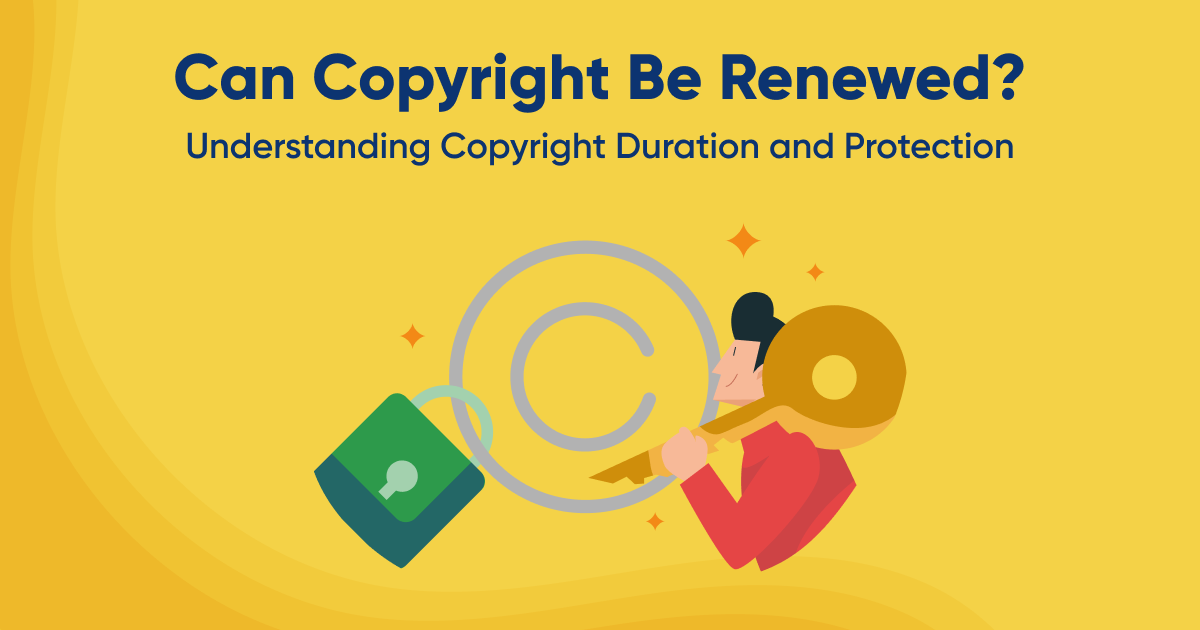Can Copyright Be Renewed?
The fruits of creativity deserve protection. Copyright law exists to safeguard the original works of authors, artists, and creators, granting them exclusive rights to control how their work is used. But this protection isn't eternal. So, the question arises: Can copyright be renewed?
The answer depends on when the work was created. This blog delves into the intricacies of copyright duration and renewal, equipping you with the knowledge to navigate copyright protection for your creative endeavors.
Basics of Copyright
Imagine copyright as a legal shield protecting your original creative work. It gives you, the creator, exclusive control over how your work is used.
What Does Copyright Protect?
Copyright safeguards various original works you create, including:
- Literary works: Books, articles, poems, website content, code, scripts, etc.
- Musical compositions: Songs, musical scores, instrumental pieces, etc.
- Visual arts: Paintings, photographs, sculptures, graphic designs, etc.
- Films: Movies, documentaries, animations, etc.
- Computer programs: Software, code, etc.
What Rights Do You Have as a Copyright Holder?
Copyright grants you a bundle of exclusive rights, meaning you get to decide:
- Reproduction: Who can make copies of your work (e.g., printing a book, copying a song).
- Derivative works: Who can create new works based on yours (e.g., translating a book, making a movie based on a novel).
- Distribution: Who can distribute copies of your work to the public (e.g., selling books, streaming music).
- Public performance or display: Who can perform or show your work publicly (e.g., playing a song in a restaurant, exhibiting a painting).
Important Points to Remember:
- Copyright protection arises automatically when you create an original work. You don't need to register it (although registration offers certain benefits).
- The key word is "original." Copyright protects the way you express your ideas, not the ideas themselves.
- There are limitations on copyright, such as fair use, which allows limited use of copyrighted material for purposes like criticism, commentary, or news reporting.
The Copyright Term: How Long Does Protection Last?
The duration of copyright protection varies depending on the date of creation and whether the work is published or unpublished. Here's a breakdown:
- Works Created After January 1, 1978 (Published or Unpublished): The general rule is that copyright protection lasts for the author's life plus an additional 70 years.
- Anonymous or Pseudonymous Works (Created After January 1, 1978): For works where the author's identity is not revealed, protection lasts 95 years from first publication or 120 years from creation, whichever expires first.
- Works Made for Hire (Created After January 1, 1978): These works, created by an employee within the scope of their employment, are typically owned by the employer. The copyright term lasts 95 years from first publication or 120 years from creation, whichever expires first.
- Works Created Before January 1, 1978: The rules for pre-1978 works are more complex and may involve renewal registration (discussed later).
Can Copyright Be Renewed? The Pre-1978 Scenario
Prior to the Copyright Act of 1976, copyright protection in the United States lasted for an initial term of 28 years. Creators had the option to renew the copyright for an additional 28 years if certain conditions were met. This renewal process ensured extended protection for their work.
However, the Copyright Act of 1976 significantly extended copyright terms and eliminated the mandatory renewal requirement for works created after January 1, 1978.
So, Do I Need to Renew My Copyright?
If your work was created after January 1, 1978, the answer is a resounding no. You don't need to worry about copyright renewal. The copyright automatically subsists for the duration mentioned above.
However, for works created before January 1, 1978, the situation is different. Renewal registration might be necessary to maintain copyright protection beyond the initial 28-year term.
Beyond Renewal: Protecting Your Work
While copyright renewal might not be applicable for most creators today, there are other steps you can take to safeguard your work:
- Copyright Registration: Although not mandatory for works created after 1978, copyright registration offers several benefits. It establishes a public record of your copyright claim, strengthens your position in case of infringement, and allows you to seek statutory damages and attorney's fees if your copyright is violated. You can register your copyright online through the U.S. Copyright Office website.
- Maintain Proper Copyright Notice: While not required for copyright protection, including a copyright notice on your work can deter infringers and inform others of your copyright claim. The standard copyright notice format is "© [Year of creation] [Your Name]".
- Licensing: Consider licensing your work if you want to allow others to use it while retaining some control. Licenses can be tailored to specific uses and terms.
Conclusion
Understanding copyright duration and renewal is crucial for creators to protect their intellectual property. While the renewal process is no longer relevant for most works, copyright registration and other proactive measures remain valuable tools for safeguarding your creative output.
By familiarizing yourself with copyright law and taking appropriate steps, you can ensure your work receives the protection it deserves. Remember, copyright is a complex area, and this blog serves as a general overview. If you have specific questions or concerns, consulting a copyright attorney is always recommended.
Frequently Asked Question
Do I need to renew my copyright?
No, if your work was created on or after January 1, 1978, you don't need to renew your copyright. The copyright automatically lasts for the life of the author plus 70 years (or 95/120 years for certain cases).
When is copyright renewal necessary?
Renewal is only necessary for works created before 1978. These works had an initial term of 28 years, with the option to renew for an additional 28 years.
Who can renew a copyright?
Only the author or their heirs can renew the copyright. If the author is deceased, their spouse, children, or the executor of their will can claim renewal.
How do I renew a copyright?
Renewal for pre-1978 works is no longer possible in most cases. The deadline to renew has already passed for most works.







